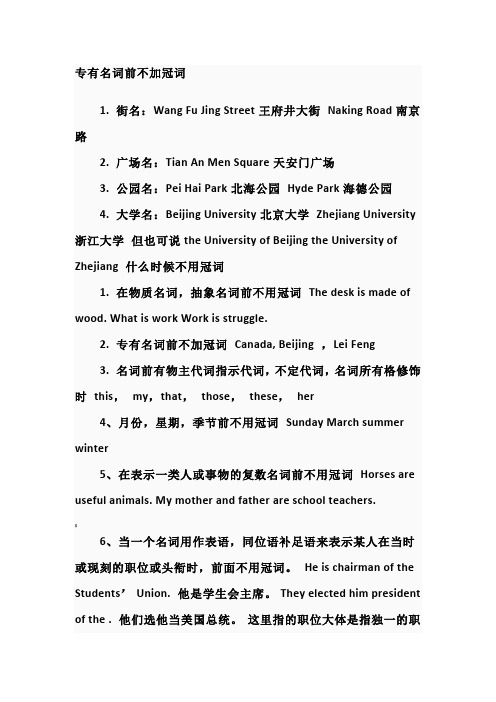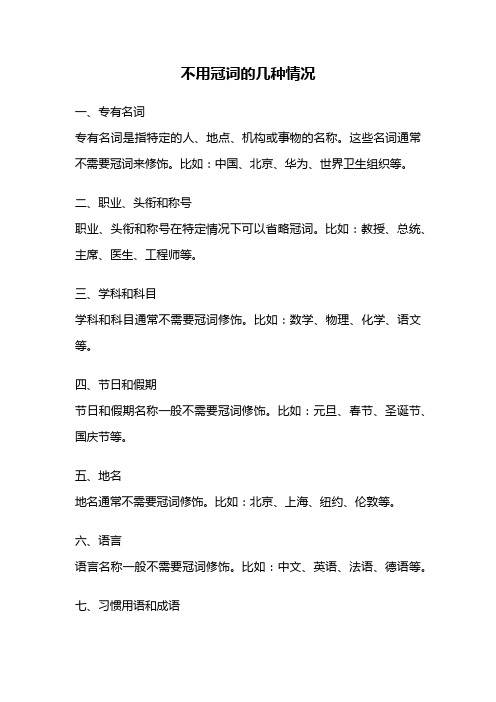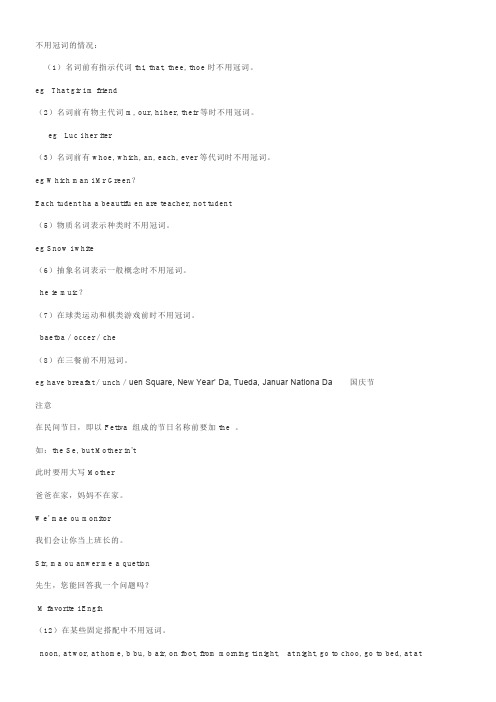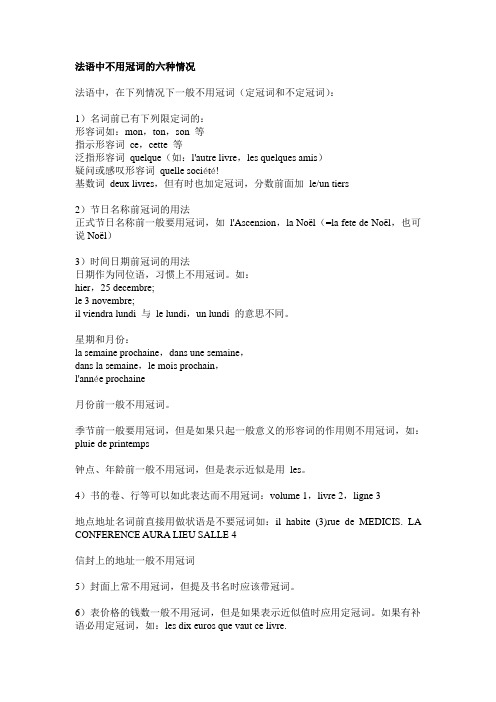不用冠词的情况
专有名词前不加冠词的情况

专有名词前不加冠词1. 街名:Wang Fu Jing Street王府井大街Naking Road南京路2. 广场名:Tian An Men Square天安门广场3. 公园名:Pei Hai Park北海公园Hyde Park海德公园4. 大学名:Beijing University北京大学Zhejiang University 浙江大学但也可说the University of Beijing the University of Zhejiang 什么时候不用冠词1. 在物质名词,抽象名词前不用冠词The desk is made of wood. What is work Work is struggle.2. 专有名词前不加冠词Canada, Beijing ,Lei Feng3. 名词前有物主代词指示代词,不定代词,名词所有格修饰时this,my,that,those,these,her4、月份,星期,季节前不用冠词Sunday March summer winter5、在表示一类人或事物的复数名词前不用冠词Horses are useful animals. My mother and father are school teachers.$6、当一个名词用作表语,同位语补足语来表示某人在当时或现刻的职位或头衔时,前面不用冠词。
He is chairman of the Students’Union. 他是学生会主席。
They elected him president of the . 他们选他当美国总统。
这里指的职位大体是指独一的职位,“主席”、“主任”都只有一个,如不是独一的要加不定冠词。
She is a teacher of English in our school. 她是我校的一位英语教师7、在三餐前不用冠词。
breakfast, lunch, supper 如这些词前有形容词修饰可用不定冠词。
名词前不用冠词的情况

名词前不用冠词的情况一、表泛指的物质名词前物质名词表示泛指或一般概念时,其前通常不用冠词。
如:Snow is falling all over the country. 全国各地都在下雪。
Air and water are the most important but the cheapest things. 空气和水是最重要、也是最便宜的东西。
【注意】若要表示特指意思,则物质名词前要用定冠词。
如:The air in the room was bad. 屋里的空气不好。
The water in the fiver has fallen two feet. 河水下降了两英尺。
二、表泛指的抽象名词前抽象名词表示泛指或一般概念时,其前通常不用冠词。
如:She knows nothing about music. 她对音乐一无所知。
Failure is the mother of success. 失败是成功之母。
【注意】若要表示特指意思,则抽象名词前要用定冠词。
如:I like the music of Mozart. 我喜欢莫扎特的曲子。
三、表泛指的复数名词前复数名词表示泛指(非特指)意义时,其前通常不用冠词。
如:Children like to play. 孩子喜欢玩耍。
Trees drop their leaves in autumn. 树木在秋季落叶。
Students must not look at their books during examinations. 学生考试不准舞弊。
【注意】若表示特指意义,复数名词前应用定冠词。
如:The children are playing in the yard. 孩子们在院子里玩。
She stopped at the first of the trees. 她在第一棵树前停了下来。
四、节假日及星期或月份等前按英语习惯,在节假日、星期、月份等通常不用冠词。
不用冠词的几种情况

不用冠词的几种情况
一、专有名词
专有名词是指特定的人、地点、机构或事物的名称。
这些名词通常不需要冠词来修饰。
比如:中国、北京、华为、世界卫生组织等。
二、职业、头衔和称号
职业、头衔和称号在特定情况下可以省略冠词。
比如:教授、总统、主席、医生、工程师等。
三、学科和科目
学科和科目通常不需要冠词修饰。
比如:数学、物理、化学、语文等。
四、节日和假期
节日和假期名称一般不需要冠词修饰。
比如:元旦、春节、圣诞节、国庆节等。
五、地名
地名通常不需要冠词修饰。
比如:北京、上海、纽约、伦敦等。
六、语言
语言名称一般不需要冠词修饰。
比如:中文、英语、法语、德语等。
七、习惯用语和成语
习惯用语和成语中的名词通常不需要冠词修饰。
比如:心上人、路上人、吃饭穿衣等。
八、时间表达
时间表达中的星期、月份、季节等通常不需要冠词修饰。
比如:星期一、七月、夏天等。
九、序数词和基数词
序数词和基数词通常不需要冠词修饰。
比如:第一、十二、一百等。
十、部分漏掉冠词的固定短语
有些固定短语中的名词会省略冠词,例如:上学、下班、回家、去医院、上楼、下车等。
以上是一些常见的不用冠词的情况。
在使用时,我们需要根据具体的语境来判断是否需要使用冠词。
正确地使用冠词可以使语言更加准确、流畅。
希望以上内容对您有所帮助。
名词前不用冠词的情况总结

名词前不用冠词的情况总结-标准化文件发布号:(9556-EUATWK-MWUB-WUNN-INNUL-DDQTY-KII名词前不用冠词的情况总结名词前不用冠词的情况英语中误用冠词的情况经常发生,为了避免同样的错误出现,现在把不需要冠词的场合列举如下,以作参考:㈠无特指意义的物质名词前不用冠词,如:1. Gold isprecious.2. Air is indispensable toanimals.3. Electricity is a form ofenergy.㈡无特指意义的抽象名词前不用冠词,如:4. Unity isstrength.5. Knowledge ispower.6. Samson is a man of bravery.㈢无特指意义的复数名词前不用冠词,如:7. Doctors cure patients.8. Axes are tools for cutting wood.9. Those people are teachers, not students.㈣有关餐食的名词前不用冠词,如:10. Dinner isready.11. After lunch, you may take a nap.12.What do you eat for breakfast?㈤有关四季的名词前不用冠词,如:13. I like autumnmost.14. Do you have to teach insummer15. Winter is over; will spring be far away?㈥有关游戏和运动的名词前不用冠词,如:16. Fandi can play soccer very well.17. Do yo like to playchess18. Is bridge a popular game here?㈦有关疾病的名词前不用冠词,如:19. Old People tend to suffer from diabetes.20.Many women are inflicted withrheumatism(['ru:mtizm,'ru-]n. 风湿病).㈧有关学科或带“-ism”后缀的名词前不用冠词,如:21. Mathematics and physics are difficultsubjects.22. Which do you prefer, imperialism ([im'pirilizm]n. 帝国主义,capitalistimperialism:资本帝国主义) or communism?㈨在“by + 交通工具”的片语里名词前不用冠词,如:23. Shall we walk or go bybus24. The tourists came byplane.25. Do you like to travel by land or by sea?㈩关于“人、节日、地理、建筑物、语言”等的专有名词前不用冠词,如:26. Tony wants to seeSusan.27. Christmas is a widely celebratedfestival.28. Europe is more advanced thanAfrica.29. Do you know where Buckingham Palaceis30.Is Japanese similiar to Chinese?上述是无须冠词的例句,但当专有名词之前有修饰语时,可以用定冠词(例(31)-(32));当抽象名词被形容词、短语或分句修饰时,也可以有适当的冠词(例(33)-(36)):31. Caesar was an ancient hero. Do you admire the great Caesar andhisdeeds32. We enjoy reading the great works written by the immortal ([i'm:tl]adj.不朽的;神仙的;长生的)Shakespeare.33. A little knowledge is a dangerousthing.34. The wisdom of Solomon was recorded inhistory.35. Tom showed a courage worthy of specialmention.36. I find it hard to forget the generosity with which David treated me.。
不用冠词的情况

不用冠词的情况:(1)名词前有指示代词thi, that, thee, thoe时不用冠词。
eg That gir i m friend(2)名词前有物主代词m, our, hi her, their等时不用冠词。
eg Luc i her iter(3)名词前有whoe, which, an, each, ever等代词时不用冠词。
eg Which man i Mr Green?Each tudent ha a beautifu en are teacher, not tudent(5)物质名词表示种类时不用冠词。
eg Snow i white(6)抽象名词表示一般概念时不用冠词。
he ie muic?(7)在球类运动和棋类游戏前时不用冠词。
baetba/occer/che(8)在三餐前不用冠词。
eg have breafat/unch/uen Square, New Year’ Da, Tueda, Januar Nationa Da国庆节注意在民间节日,即以Fetiva 组成的节日名称前要加the 。
如:the Se, but Mother in't此时要用大写Mother爸爸在家,妈妈不在家。
We' mae ou monitor我们会让你当上班长的。
Sir, ma ou anwer me a quetion先生,您能回答我一个问题吗?M favorite i Engih(12)在某些固定搭配中不用冠词。
noon, at wor, at home, b bu, b air, on foot, from morning ti night, at night, go to choo, go to bed, at at4在有些词组中,用冠词和不用冠词意思有较大区别。
in ho,ome等时就不用冠词。
V冠词的易错点:1It' time for dinner King are at tabeA /,theB the, theC The,/ D/,/答案: C 在姓氏复数前用the表示一家人,就餐用at tabe2-What do ou uua have for breafat-I often have bread and miA/,/ B/,the C a,/ D the, the答案: A 物质名词前一般不用冠词。
法语中不用冠词的六种情况

法语中不用冠词的六种情况法语中,在下列情况下一般不用冠词(定冠词和不定冠词):1)名词前已有下列限定词的:形容词如:mon,ton,son 等指示形容词ce,cette 等泛指形容词quelque(如:l'autre livre,les quelques amis)疑问或感叹形容词quelle société!基数词deux livres,但有时也加定冠词,分数前面加le/un tiers2)节日名称前冠词的用法正式节日名称前一般要用冠词,如l'Ascension,la Noël(=la fete de Noël,也可说Noël)3)时间日期前冠词的用法日期作为同位语,习惯上不用冠词。
如:hier,25 decembre;le 3 novembre;il viendra lundi 与le lundi,un lundi 的意思不同。
星期和月份:la semaine prochaine,dans une semaine,dans la semaine,le mois prochain,l'année prochaine月份前一般不用冠词。
季节前一般要用冠词,但是如果只起一般意义的形容词的作用则不用冠词,如:pluie de printemps钟点、年龄前一般不用冠词,但是表示近似是用les。
4)书的卷、行等可以如此表达而不用冠词:volume 1,livre 2,ligne 3地点地址名词前直接用做状语是不要冠词如:il habite (3)rue de MEDICIS. LA CONFERENCE AURA LIEU SALLE 4信封上的地址一般不用冠词5)封面上常不用冠词,但提及书名时应该带冠词。
6)表价格的钱数一般不用冠词,但是如果表示近似值时应用定冠词。
如果有补语必用定冠词,如:les dix euros que vaut ce livre.1、问时间Quelle heure est-il?Est-ce que tu as l’huere?As-tu l’heure?2、无人称句型Il y a …,加上名词后即成为“有…”3、询问他人姓名Comment t’appelles-tu?Comment vous appelez-vous?Comment s’appelle-t-il?4、询问有多少东西Combine de +名词+ y a-t-il +状语5、询问日期今天几号:Quelle date sommes-nous aujourd’hui?今天星期几:Quel jour sommes-nous aujourd’hui?今年是哪年:quelle année sommes-nous?6、表达日期规定日期说法是用“nous sommes”,加上定冠词“le”,再加上数字星期几也用“nous sommes”,直接加上Lundi、Mardi等就可以表达年份时,用介词en,如:nous sommes en mille neuf cent quatre-vingt-dix.从几点到几点:de …à…7、面积大小Quelle surface fait la chamber?Quelle surface mesure la chamber?La chamber fait (mesure) quatre mètres sur trios.这个房子的面积是四米长,三米宽。
谈谈名词前不用冠词的几种情形

aptations for kids,Guillermo del Toro,the direc-tor,wanted to show the importance of disobedi-ence when facing misconceptions and unfair-ness.“I think it’s a lesson that’s urgent in the world,”he told AP News.“We are saying dis-obedience is not only necessary,but it is also a virtue.”In recent years,there’s been a stigma that animated movies are just a kids’genre.But del Toro wanted to hit back.“Animation is ready to be taken to the next step.We are all ready for it.Please help us.Keep animation in the conversation,”del To-ro told the Oscars audience.同的是,导演吉尔莫·德尔·托罗想要展示的是,面对误解和不公时不屈从的重要性。
“我认为这是世界亟需的一课,”德尔·托罗在接受美联社采访时表示,“我们要说的是,不屈从不仅是必要之举,也是一种美德。
”近年来,有人将动画电影看作仅仅拍给孩子看的电影流派,但德尔·托罗想反击这种观点。
德尔·托罗对奥斯卡观众说,“动画已经准备好更进一步,我们也都准备好了,请帮帮忙,去关注、谈论动画吧。
”冠词是一种虚词,它无法单独使用,只能用于名词前,起修饰和限制作用。
但是在某些情形下,名词前面不用冠词。
不用冠词的情况

什么情况下不用英语“冠词”作者:网编整理来源:新东方论坛时间:2013-12-09在冠词的学习过程中,什么情况下使用冠词,什么情况下不使用冠词,我们都很熟悉。
但下列不使用冠词的情况我们需特别注意。
1. 表示头衔、职务、职称、身份等的名词,在句中作表语、宾(主)补时,该名词常不与冠词连用。
如:Lincoln became President of the United States. 林肯成为美国总统。
Li Ming was made monitor of our class. 李明被选为我们班的班长。
2. turn作为系动词,且当"变成"解时,其后的表语若为单数可数名词,一般不用冠词。
如:His brother turned thief. 他哥哥成了小偷。
对比:His brother became a thief.但作表语的名词前有形容词修饰时,则该名词前常有不定冠词。
如:His brother turned a great inventor. 他哥哥成了一位伟大的发明家。
3. 书名、标题前一般不用冠词。
如:Do you have "From Earth to Moon"? 你有《从地球到月亮》这本书吗?Have you read "Oliver Twist"? 你读过《雾都孤儿》吗?4. 以as,though引导的让步状语从句,名词放于句首时,该名词前常不用冠词。
如:Child as he is,he knows a lot about it.尽管他是小孩,但这件事他知道很多。
Girl though she was,she dared to face the enemy. 尽管她是女孩,但她敢面对敌人。
5. man,woman表泛指时,常不用冠词,且用单数形式。
如:Man will change nature. 人类将会改变自然。
Man tries to be a protector of woman.男人试图做女人的保护者。
- 1、下载文档前请自行甄别文档内容的完整性,平台不提供额外的编辑、内容补充、找答案等附加服务。
- 2、"仅部分预览"的文档,不可在线预览部分如存在完整性等问题,可反馈申请退款(可完整预览的文档不适用该条件!)。
- 3、如文档侵犯您的权益,请联系客服反馈,我们会尽快为您处理(人工客服工作时间:9:00-18:30)。
什么情况下不用英语“冠词”作者:网编整理来源:新东方论坛时间:2013-12-09在冠词的学习过程中,什么情况下使用冠词,什么情况下不使用冠词,我们都很熟悉。
但下列不使用冠词的情况我们需特别注意。
1. 表示头衔、职务、职称、身份等的名词,在句中作表语、宾(主)补时,该名词常不与冠词连用。
如:Lincoln became President of the United States. 林肯成为美国总统。
Li Ming was made monitor of our class. 李明被选为我们班的班长。
2. turn作为系动词,且当"变成"解时,其后的表语若为单数可数名词,一般不用冠词。
如:His brother turned thief. 他哥哥成了小偷。
对比:His brother became a thief.但作表语的名词前有形容词修饰时,则该名词前常有不定冠词。
如:His brother turned a great inventor. 他哥哥成了一位伟大的发明家。
3. 书名、标题前一般不用冠词。
如:Do you have "From Earth to Moon" 你有《从地球到月亮》这本书吗Have you read "Oliver Twist" 你读过《雾都孤儿》吗4. 以as,though引导的让步状语从句,名词放于句首时,该名词前常不用冠词。
如:Child as he is, he knows a lot about it.尽管他是小孩,但这件事他知道很多。
Girl though she was, she dared to face the enemy. 尽管她是女孩,但她敢面对敌人。
5. man,woman表泛指时,常不用冠词,且用单数形式。
如:Man will change nature. 人类将会改变自然。
Man tries to be a protector of woman.男人试图做女人的保护者。
6. word指"消息",nature表示"自然;自然界"时,常不用冠词。
如:Word came that I was wanted on the phone. 有消息说有人给我打电话。
Is nature at its best in spring 自然界在春天时最美丽吗7. 两个名词指同一个人时,后一个名词前常不用冠词。
如:The poet and writer is going to give us a talk. 这位诗人兼作家打算给我们做报告。
8. 当no用作形容词修饰名词,或与such连用修饰名词时,名词前常不用冠词。
如:She has no mother. 她没有妈妈。
There is no such word. 没有这样的单词。
9. 在"fool(man)+enough+to do"结构中,该名词前常不用冠词。
如:I was fool enough to accept his offer. 我接受他的提议真是够傻的。
10. 在"名词+介词短语"结构中,名词前常不用冠词。
如:The teacher came in, book in hand. 老师进来了,手里拿着书。
但在"with+名词+介词短语"结构中,名词前常要加冠词。
如上面例句可改为:The teacher came in, with a book in his hand.八、一些不用冠词或省略冠词的情况44 不使用冠词的情况*不使用冠词的情况可以称为零冠词(zero article)。
前面讲到的不使用冠词的情况可归纳如下:a.专有名词前一般不加冠词:Baghdad has a centuries-old history.巴格达有悠久的历史。
Stuart has been to China and he loves the country deeply.斯图亚特到过中国,他深深地爱着这个国家。
b. 可数名词复数用于一般意义时,不加冠词:Horses are useful animals.马是非常有用的动物。
…c. 抽象名词用于一般意义时不加冠词:Life is short;art is long.生命短暂,而艺术长存。
…d.物质名词用于一般意义时不加冠词:We use water for drinking and washing.我们饮水并用水洗东西。
…*此外还有下面不加冠词的情况:a.呼语:Good evening,children! 孩子们,晚安!Can I help you, ma’am (madam) 我能为你做点什么,夫人b.对家人和亲属的称呼:Mum, could you give me some money 妈妈,你能给我点儿钱吗Grandma could hardly believe it.奶奶简直不能相信这事。
c.季节、月份、日期、节日名称前一般不加冠词:Autumn is a beautiful season.秋天是美丽的季节。
We’ve had to put our wedding off until September.我们得把婚礼延期到九月举行.d.在daybreak,dawn,noon,midnight,dusk,night,sunset,sunrise这类时间名词前都不加冠词:At dusk the lights of the village come on.黄昏十分乡村的灯亮了。
…e.抽象化的个体名词(如bed,church,class,college,school,university,work,hospital,court,prison,market,sea,town等)前一般不加冠词:It was too late for bed.现在睡觉太晚了。
…f.在大量的成语中名词前不加冠词,单是make和put就可构成许多这类成语:make friends with和…交朋友 make fun of开…的玩笑make advances to设法接近 make allowances for考虑到(某种因素)make amends for弥补(过失) make ends meet使收支相抵make eyes at向…做媚眼 make haste赶紧45 省略冠词的情况在不少情况下还有省略冠词的情况,如:*新闻标题:(The) City Congress to be in session Monday市议会星期一开会(A) Supermarket Fire Disaster超市大火成灾*通知说明:(The) Tigers (are) dangerous.老虎危险。
Cut along(the)dotted line.沿虚线剪开。
*提纲:(The) Causes of (the) World War II:massive re-armament,(the) invasion (of) Czechoslovakia... 第二次世界大战起因:大规模重新武装,入侵捷克…(The) Algerian crisis led to (the) downfall of (the) French government in May 1958.阿尔及利亚危机导致法国政府于1958年5月倒台。
*剧本提示:Alina (Open (the) door quickly;to Alexander):Come in, quickly. 艾琳娜(迅速开门,对亚历山大说):快进来。
Exit in (the) courtyard.出去到院子去。
*书名及字典解释:(The) BBC English Dictionary BBC英语词典filling:(a) material used to fill (a) cavity in (a) tooth.补牙填料:用来填入牙内空洞的材料。
大家除了掌握使用冠词的基本规则外,还应不拘泥于规则,注意冠词的活用:1.表示世界上独一无二的事物的名词前一般加定冠词the; 但如果名词前有修饰语,也可能用不定冠词a,an。
the world,a peaceful worldthe moon,a bright moon在这样的情况下,独一无二的单词被“泛指化”。
也就是说,moon虽然独一无二,但是当用bright来修饰moon的时候,不同状态的moon就构成了“多种多样的moon”,而此处的bright moon,就需要用泛指了。
2.表示一日三餐的名词前面一般不用冠词,但前面如果有了定语修饰,也可能用不定冠词a,an。
Have you had (/) supper.We had a wonderful supper.3.表示乐器的名词前一般用定冠词the,但前面如果出现定语修饰,也可能用不定冠词a,an。
He starts his day by playing the violin.He is playing a borrowed (/) violin.4.介词与表示交通工具的名词连用表示笼统的方式,前面一般不用冠词,但如果名词的前面出现了修饰语,前面需加冠词。
He went to the station by (/) car.He went to the station in a black car.5.表示语言的名词前一般不用冠词,但后面如果出现language一词,前面需加定冠词the。
(/) English=the English language (/) French=the French language6. turn用作系动词时,后面作表语的单数名词前不用冠词。
He turned (/) writer many years later.(=He became a writer many years later.)。
